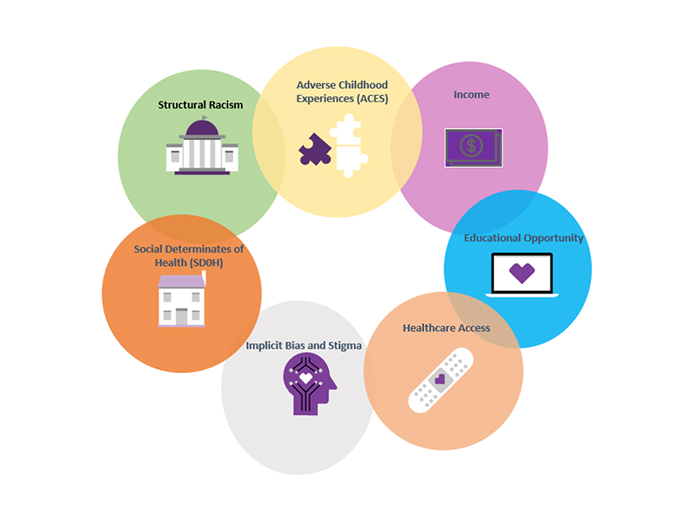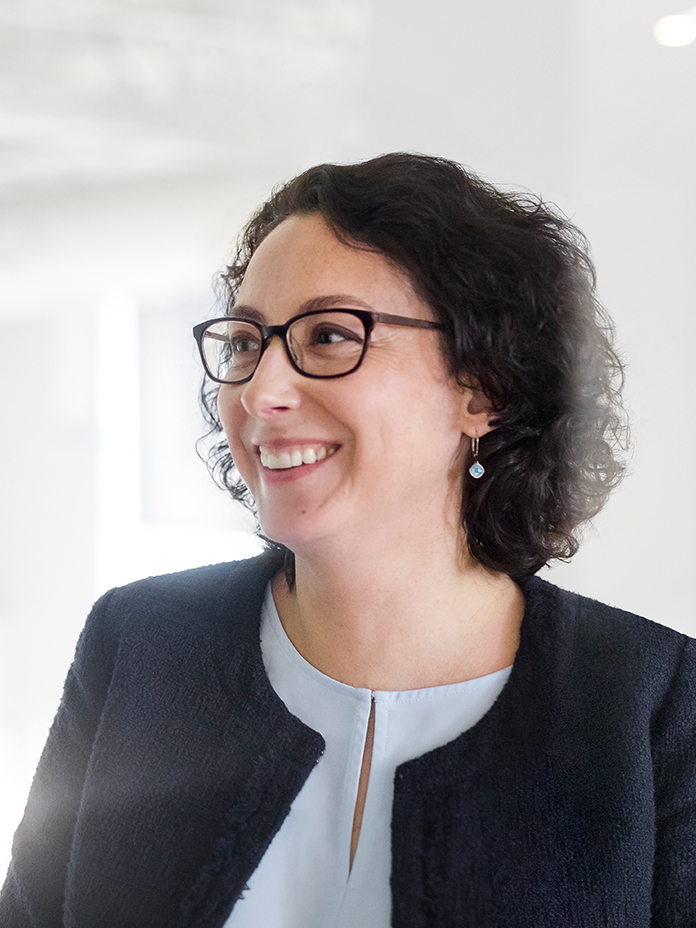Aetna Better Health® of Ohio does not provide the info on the next page. If you don’t want to leave our site, choose the “X” in the upper right corner to close this message. Or choose “Go on to next website” to move forward.
Who’s at risk of experiencing inequities?

Who’s at risk of experiencing inequities?
Achieving health equity is a complex challenge affecting specific populations as a result of deep-rooted barriers that negatively influence people’s living conditions, access to healthcare, and overall health status. Children and youth with complex behavioral health needs are at greater risk for experiencing health inequities.
OhioRISE is investing in improving health equity through education, training and person-centered interventions aimed at increasing trust, raising awareness, reducing stigma, and closing gaps in care and health outcomes.
Root causes of inequities
Root causes of inequities
Understanding the fundamental drivers of health inequality is key to developing and implementing meaningful solutions for Ohio’s children and youth with complex behavioral health needs.

OhioRISE health equity strategy
As part of our steadfast commitment to address health equity and promote culturally responsive care for children and youth and families throughout all 88 counties, OhioRISE is implementing policies and practices that focus on access to care and patient-centered interventions. OhioRISE will also engage in improvement strategies and use quality improvement science and other evidence-based performance measures to gauge the success of our work. We are committed to continuous improvement: when we meet our performance targets, we recalibrate and strive to do even better.
The OhioRISE Plan intends to establish ourselves as industry leaders in the development of best practice standards in health equity. These goals can only be achieved by collaborating with providers and stakeholders to ensure OhioRISE children and youth receive high quality, equitable healthcare services, and linkage to non-clinical community-based supports.
Policies and practices
Collaboration with all managed care entities
Evidence-based best practices and industry standards alignment
Value-based services
Non-discriminatory practices
Health equity team
Quality improvement
Training
Cultural competency
Trauma informed
Implicit bias
Person-centered
QI science
Workforce development
Access
Social determinants of health (SDOH) support through closed-loop referrals
Population Health Analytics
Enhancing natural and informal support
Improving health literacy and education
Effective communication through culturally and linguistically appropriate services
Person-centered focus
Personalized care experience addressing members’ whole-person needs
Care coordination
Social risk scores
Enhanced benefits
Advisory councils
Digital platforms
The equity journey begins with knowing ourselves, our communities, and the members we serve.
OhioRISE will listen, learn, and connect to improve conditions by:
- Listening to understand community needs from those who have first-hand experiences.
- Using data sets to identify needs and connect to resources.
- Embedding family voice and choice into all aspects of OhioRISE.
Health information should be accessible to all, so no matter what the situation, an individual can get informed about decisions they need to make to feel and be well. OhioRISE literature provides information to our members about their providers, treatment, and care coordination options so they have opportunities to access care and engage in making changes to improve their quality of life. OhioRISE initiates member engagement to meet our members’ immediate and longer-term social, emotional, and physical needs.
By focusing on health literacy and health equity issues, OhioRISE can improve the accessibility of healthcare services for our members. We advance healthy equity through our education efforts using these best practice guidelines:
Speaks to me: We incorporate the ideas and first-hand experiences of youth, families, and other stakeholders when developing materials or engaging in communication efforts with OhioRISE targeted audiences.
Readability: We provide clear and concise information that is easy to understand for all audiences, while also being mindful of the communication preferences of youth and families. Through our advisory councils, we will seek input from our members, families, and their providers to guide the information we share.
Picture this: We ensure the images and graphics used in all OhioRISE communications are representative of those we serve. Through our advisory councils, we will seek input from the targeted population to guide image selections.
Who benefits: We seek to include messages from relatable peers and early adopters to help convey messages that are engaging, beneficial, and effective.
Accessible communication
OhioRISE actively works to develop and deliver information in the formats that best work for members:
Members and providers can access Language Services by contacting 1-833-711-0773 (TTY: 711) at no cost to the member. Representatives are available from 7 a.m. to 8 p.m., Monday through Friday.
Members are provided documentation in their preferred language.
For individuals who are deaf or hard of hearing, our staff are trained to communicate using text telephone (TTY)/telecommunication device for the deaf (TDD).
Members living with impaired vision are offered materials printed in larger font or braille, as requested.
Our commitment to providers
Everyone has a role to play in eliminating health disparities through intentional and meaningful action. Wherever your organization is on the equity journey, we are here to support you. The OhioRISE Health Equity Specialists and Population Health Specialists are eager to partner with your organization on your health equity improvement initiatives.
We offer the following:
Quarterly data sharing (individual, provider specific, social determinants of health and system level).
Subject-matter expertise on health disparities and population health needs.
Health equity training.
Provider advisory committees.
Quality improvement initiatives.
Community engagement.
Analyzing and addressing gaps in care.
Translation services.
Support for closed-loop social determinants of health (SDOH) referrals.
Our commitment to providers

Our commitment to providers
Everyone has a role to play in eliminating health disparities through intentional and meaningful action. Wherever your organization is on the equity journey, we are here to support you. The OhioRISE Health Equity Specialists and Population Health Specialists are eager to partner with your organization on your health equity improvement initiatives.
We offer the following:
Quarterly data sharing (individual, provider specific, social determinants of health and system level).
Subject-matter expertise on health disparities and population health needs.
Health equity training.
Provider advisory committees.
Quality improvement initiatives.
Community engagement.
Analyzing and addressing gaps in care.
Translation services.
Support for closed-loop social determinants of health (SDOH) referrals.
Our PAC is made up of representatives from the OhioRISE provider network. The PAC meets quarterly to:
Share perspectives on how we can better serve our members.
Provide expert council to improve access, provider satisfaction and connection to specialty providers.
Review satisfaction survey results.
Review quality improvement strategies.
Provide actionable feedback on policies and programs to improve care for our members.
Examine and implement improvement strategies related to addressing social determinants of health (SDOH) gaps.
We also help providers understand and act on member, provider, and systemic data to improve the quality of care and increase patient satisfaction. To better understand the needs of each community, we work with providers to track their data and analyze from a regional perspective with the goal of identifying areas of improvement, such as provider education and training.
Strengthening provider relationships with patients is essential to improve health equity. OhioRISE supports providers as they establish trust with the youth and families we serve by:
Recruiting, promoting and supporting a culturally and linguistically diverse provider workforce that is responsive to the population in the service area.
Training organization staff to engage in improving health equity, which includes an understanding of unconscious bias, adverse childhood experiences (ACEs), social determinants of health (SDOH), health disparities, structural racism, and culturally and linguistically appropriate practices.
Ensuring that providers work with their members to operationalize the availability of language assistance services in the members preferred language, verbally and in writing.
Sharing information on the languages contracted providers speak fluently.
Ensuring all provider forms align with best practice standards for inclusion.
Providing education, referral and/or support for those who needed services outside of traditional business hours.
Providing follow-up with members and families to ensure linkage with social determinants of health (SDOH) resource(s) was successful.
Improving health starts by ensuring youth and families have basic information about the healthcare services available to them, how those services can help, and how they can access the care they need in a timely fashion. OhioRISE communicated this information with our members through a combination of in-person, telephonic and virtual methods, including:
Community engagement events.
Focus groups.
Social media.
New-member welcome calls.
Virtual applications.
Telehealth.
Achieving health equity through collective impact
Achieving health equity through collective impact
OhioRISE is part of Ohio Medicaid’s commitment to put the individual at the center of focus and improve the design, delivery, and timeliness of care coordination. The focus of the next generation Ohio Medicaid program is on the individual with strong cross-agency coordination and partnership among managed care organizations, vendors, sister state agencies and ODM to support specialization in addressing critical needs. OhioRISE will work in close collaboration with all the Medicaid managed care entities (MCEs) and the Ohio Department of Medicaid to maximize the collective impact on improving health equity.
For more information, visit the Ohio Medicaid Managed Care website.

All seven managed care organizations, OhioRISE, and Gainwell became the foundational members of the All-MCE Health Equity Collaborative in 2021 to holistically meet the needs of the community with a keen focus to keep the member at the center of all efforts. The All-MCE Health Equity Collaborative was developed to share best practices, resources, and collectively develop innovative solutions to address barriers Medicaid members experience. This collaborative effort will address the need of Medicaid members across Ohio while supporting statewide initiatives across Ohio.
OhioRISE Team
Consisting of locally rooted Health Equity Specialists and Population Health Specialists, driving equity improvement efforts is a key function of the OhioRISE Population Health Team. The Population Health Team is available to partner with your organization on your health equity improvement initiatives.
For any questions or inquiries related to equity or population health, contact Member Services.
Resources
We comply with the Web Content Accessibility Guidelines (WCAG) 2.0, which define how to make web content more accessible to people with disabilities.
- Local resources for members
- Provider manual (PDF)
- Provider Portal
- Next Generation of Ohio Medicaid Managed Care
- HHS Think Cultural Health
